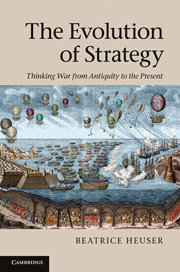Book contents
- Frontmatter
- Contents
- Acknowledgements
- A note on referencing
- Part I Introduction
- PART II Long-term constants
- PART III The Napoleonic paradigm and Total War
- 5 The age and mindset of the Napoleonic paradigm
- 6 The Napoleonic paradigm transformed: From total mobilisation to Total War
- 7 Challenges to the Napoleonic paradigm versus the culmination of Total War
- PART IV Naval and maritime Strategy
- PART V Air Power and nuclear Strategy
- PART VI Asymmetric or ‘small’ wars
- PART VII The quest for new paradigms after the World Wars
- Bibliography
- Index
5 - The age and mindset of the Napoleonic paradigm
from PART III - The Napoleonic paradigm and Total War
Published online by Cambridge University Press: 05 June 2012
- Frontmatter
- Contents
- Acknowledgements
- A note on referencing
- Part I Introduction
- PART II Long-term constants
- PART III The Napoleonic paradigm and Total War
- 5 The age and mindset of the Napoleonic paradigm
- 6 The Napoleonic paradigm transformed: From total mobilisation to Total War
- 7 Challenges to the Napoleonic paradigm versus the culmination of Total War
- PART IV Naval and maritime Strategy
- PART V Air Power and nuclear Strategy
- PART VI Asymmetric or ‘small’ wars
- PART VII The quest for new paradigms after the World Wars
- Bibliography
- Index
Summary
Napoleon was not a personality, but a principle.
(The Duke of Wellington in 1837)Causes of wars, world-views and war aims 1792–1914
Chapters 2 and 3 charted the fluctuations and the constants in warfare prior to the French Revolution. From Cicero until the French Revolution, there was agreement in the Romano-Christian world that war could only be justified if it led to peace, and a better peace than previously. There were varied opinions about the importance of battle in warfare, and many counselled extreme restraint in seeking and giving battle. While military men wrote about victory in battle, writers of all professions were aware that a lost battle did not necessarily mean the end of war, and that victory in battle needed to be followed up in certain ways to lead to peace. Even though thinkers from Machiavelli, Urrea and Bernardino de Mendoza to Vattel favoured militias drawn from local populations, armies were more often than not multinational, composed of local levies and often foreign mercenaries.
Most of this changed dramatically with the French Revolutionary and Napoleonic Wars, known in Britain as the ‘Great War’ until the First World War claimed that epithet. They were a watershed not only in the conduct of war itself, but also in thinking about war (Ford 1963/4: 18–29). Without any technological revolution, the French fought differently, with much larger armies than Europe had seen since antiquity, reaching six-figure numbers under Napoleon. His organisation of armies into columns was one element of his success, but the new tactics applied by the French were aptly summarised by the Prussian General Valentini who saw it as the conduct of small (or irregular) war, but on a much larger scale (see Part VI of this book): in battle, France’s soldiers relinquished drilled formations and sought out the enemy individually, whether by careful targeting of their muskets, or with sabre or bayonet (Valentini 1779/1820: 1–3). When challenged by the royalist armies who sought to put King Louis XVI back on the throne, the French Revolutionaries fought for themselves and for their newly won liberties. They were inspired by new political ideals, and fought for their own cause, something which Count Jacques Antoine Hippolyte de Guibert had predicted would give them a very special force (Guibert 1772/1781: 138). The Napoleonic armies – composed of an increasing percentage of foreigners – fought for France, but above all for their charismatic leader, for honour and glory.
- Type
- Chapter
- Information
- The Evolution of StrategyThinking War from Antiquity to the Present, pp. 113 - 136Publisher: Cambridge University PressPrint publication year: 2010
- 1
- Cited by



